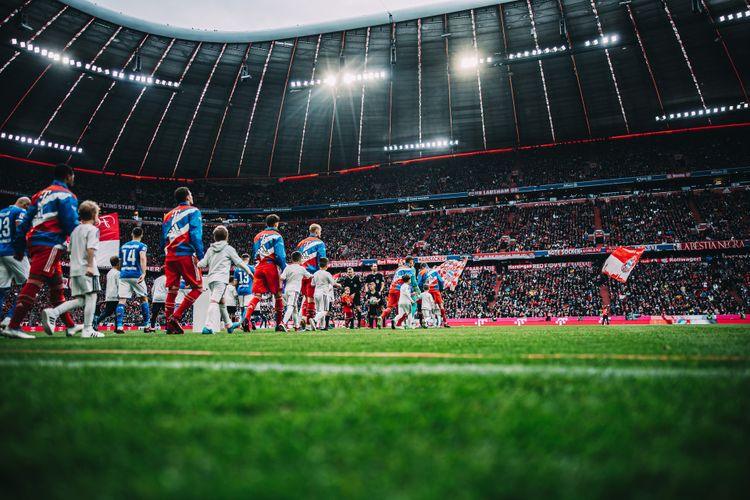Kicking Off AI with SAP Sports One and FC Bayern

SAP is expanding the SAP Sports One solution with artificial intelligence (AI). In collaboration with German professional soccer clubs FC Bayern and Hertha BSC, AI-based automation of summaries and evaluations of scouting reports has been developed.
Being a talent scout sounds like a dream job for many: travelling across the country to watch competitions in your favourite sport and being paid to do so. However, being a scout on the road means hard work. In addition to analyzing increasingly detailed statistical data — such as the number of overplayed players or the likelihood of increasing the goal count — players are scouted live at the stadium or from watching back videos.
Both the current performance and the potential of the player are portrayed as accurately as possible. The aim is to develop a comprehensive picture of the player incorporating team ability, mentality, and other important factors.
“At a professional club, a four-figure number of scouting reports can be generated during a season,” Fadi Naoum, head of Sports and Entertainment at SAP, said at SPOBIS, the largest European sports business event, taking place in Hamburg on January 31 and February 1.
Naoum presented the new AI component for scouting at the conference.
“Squad planners and chief scouts must summarize these reports in such a way that club management can make decisions based on them regarding who should be signed,” he shared. “This was previously a manual process, but now we have been able to extensively automate it, thanks to AI.”
With the help of AI in SAP Sports One, decision-makers in the sports sector now have aggregated performance reports at the touch of a button, as well as comparisons between players. Transfer decisions can be now much faster and more informed.
Large Language Model for AutomationAI is used for the consolidation and targeted processing of unstructured data, which is mostly in natural language. It is capable of considering and processing not only different languages, but also different types of note-taking and writing styles. Behind the AI component for scouting is a large language model (LLM). This deep learning algorithm can perform tasks in the field of natural language processing (NLP).
“We currently use GPT from OpenAI, but we are also evaluating language models from other providers,” Naoum said. “The decisive advantage of the LLM is that commands can be given in natural language and can be varied according to language, text length, or target audience, as needed.“
In Brazil, for example, if a scout prepares manual reports for a specific player in Brazilian Portuguese, he can have the summary generated in German for the management of his German club.
“A typical command could be: ‘Compare the players x and y with regard to their strengths and weaknesses, write a summary and give a transfer recommendation, volume 100 words, answer in German’,” Naoum explained. “Depending on your preference, you can have the result presented as a flowing text or as a management summary.”
Co-Innovation Demonstrates Strength of Generative AIIn collaboration with FC Bayern and Hertha BSC, a prototype was first created for the AI-based automated summary and evaluation of scouting reports in SAP Sports One.
“We were impressed by the high quality of the results achieved automatically in SAP Sports One using generative AI,” commented Markus Pilawa, head of Scouting at FC Bayern. “We expect huge time saving for us and, especially in the hectic transfer period, this can be another advantage for us.”
Timon Pauls, head of Squad Planning & Scouting at Hertha BSC, added: “This co-innovation project has very clearly demonstrated the actual strengths of generative artificial intelligence. The player comparisons and summaries of scouting reports that can now be created ad-hoc will be very valuable for our squad planning. “
In the near future, SAP plans to also use AI technology to enrich the results of scouting reports with information from other sources, including data about matches from external data providers. Integrating AI capabilities into other components of SAP Sports One, including performance diagnostics, training management, and match analysis, is also planned.
SAP Sports One with AI-powered scouting reporting is planned to be made available to customers worldwide in the second quarter of 2024.
SAP launched SAP Sports One as a cloud solution in 2015. The athlete management solution and team performance platform covers all sporting processes. Various components support communication, team management, training and performance control, fitness and health management tracking, scouting, squad planning, performance diagnostics, match analysis, and preparing players for their next match.
In conjunction with SAP Analytics Cloud, clubs can also evaluate a wide range of sports-related data delivered by specialized SAP partners. SAP Sports One is currently being used by 12 out of 18 German Bundesliga football clubs. SAP also offers the solution for ice hockey, basketball, and handball.
Worldwide, SAP Sports One supports more than 80 customers in 19 countries, including clubs such as FC Bayern and Hertha BSC, as well as TSG Hoffenheim and FC Sankt Pauli (Germany), BSC Young Boys Bern (Switzerland), Genoa CFC 1893 (Italy), Slavia Prague (Czech Republic), Leicester City (England), Vissel Kobe (Japan), SC Rasta Vechta (Germany, basketball), and the German Football Association.
Top image via FC Bayern Munich





































